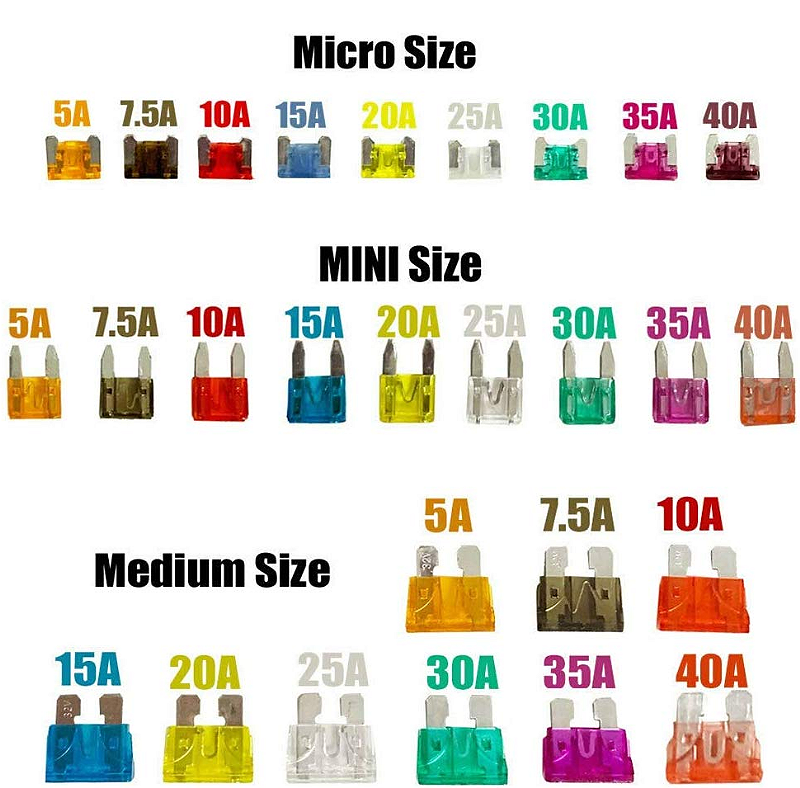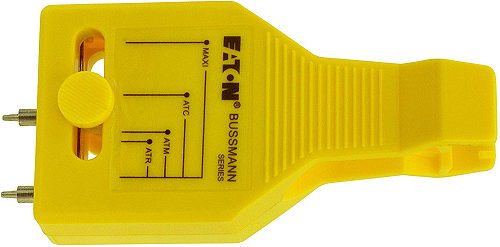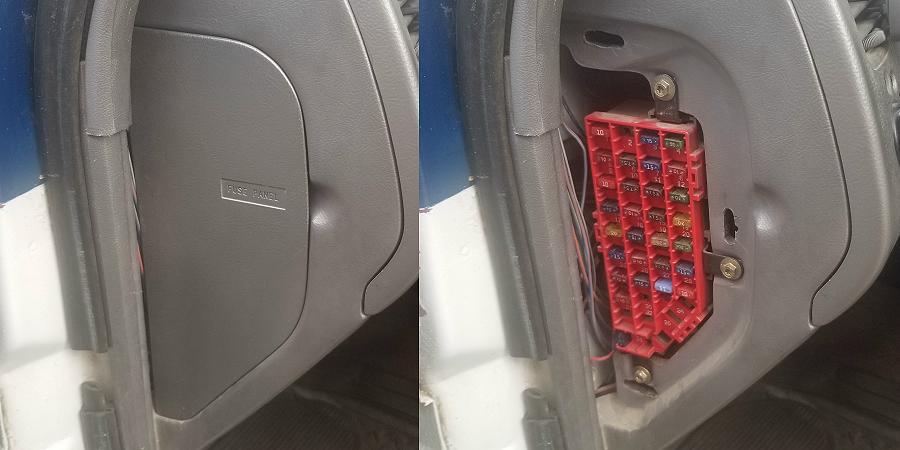
Fuses protect your vehicle’s electrical system from overloading. If electrical parts in your vehicle are not working, the system may have been overloaded and blown a fuse. Before you replace or repair any electrical parts, check the appropriate fuses.
The following charts tell you which fuses protect each electrical part of your vehicle. If a fuse blows, all the parts of your vehicle that use that circuit will not work.
Once you have determined which fuses to check, follow the procedures under Checking and Replacing Fuses further down this page.
Passenger Compartment Fuse Panel
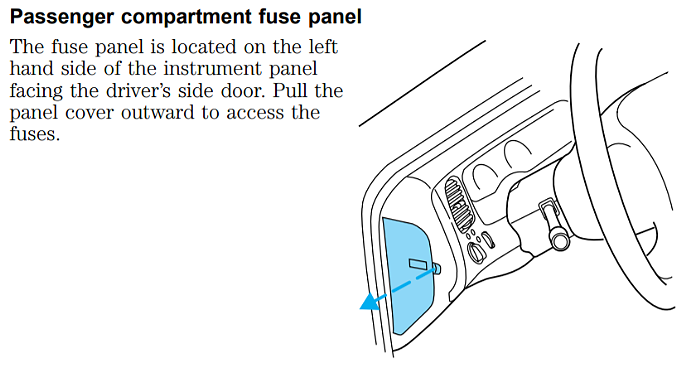
The passenger compartment fuse panel is located on the drivers side (end) of the dash board.
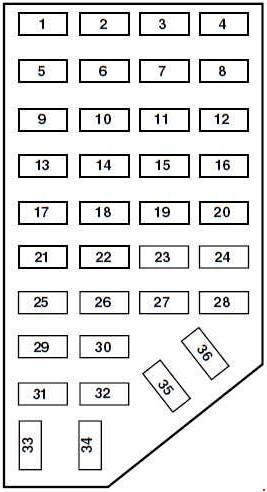
| Number | Ampere rating [A] | Description |
| 1 | 7.5 | Power Mirror |
| 2 | — | — |
| 3 | 15 | Parking lamp |
| 4 | 10 | Left Headlamp |
| 5 | 10 | Data Link Connector (DLC) |
| 6 | 7.5 | Air Bag System, Blower Relay, EATC |
| 7 | 7.5 | Illumination Switches |
| 8 | 10 | Right Headlamp, Foglamp Relay, DRL |
| 9 | 10 | Anti-lock System |
| 10 | 7.5 | Speed Control, Generic Electronic Module (GEM), A/C System, Brake Interlock |
| 11 | 7.5 | Instrument Cluster, Warning Lamps |
| 12 | 10 | Front Wash System, Power Windows |
| 13 | 15 | PCM System, Stoplamps, AWD, Anti-lock System, Speed Control |
| 14 | 20 | Anti-Lock System |
| 10 | Anti-Lock System | |
| 15 | 7.5 | Air Bag, Alternator |
| 16 | 30 | Front Wiper |
| 17 | 25 | Cigar Lighter |
| 15 | Cigar Lighter | |
| 18 | 15 | A/C System |
| 19 | 25 | PCM System, Ignition Coil |
| 20 | 7.5 | Anti-Theft, Generic Electronic Module (GEM), Radio |
| 21 | 15 | Hazard Lamps |
| 22 | 10 | Turn Signals |
| 23 | — | — |
| 24 | 10 | Starter, Anti-Theft |
| 25 | 7.5 | Speedometer, Generic Electronic Module (GEM) |
| 26 | 10 | 4R44E/4R55E/4R7OW/5R55E Overdrive, DRL System, Backup Lamps |
| 27 | 10 | Under Hood Lamp, Map Lamps, Glove Box Lamp, Dome Lamp, Visor Lamps, 4×4 System |
| 28 | 7.5 | Generic Electronic Module (GEM) |
| 29 | 10 | Audio System |
| 30 | — | — |
| 31 | — | — |
| 32 | — | — |
| 33 | 15 | Headlamps, Daytime Running Lamps (DRL) Module, Instrument Cluster |
| 34 | — | — |
| 35 | — | — |
| 36 | — | — |
Engine Compartment Fuse Panel:
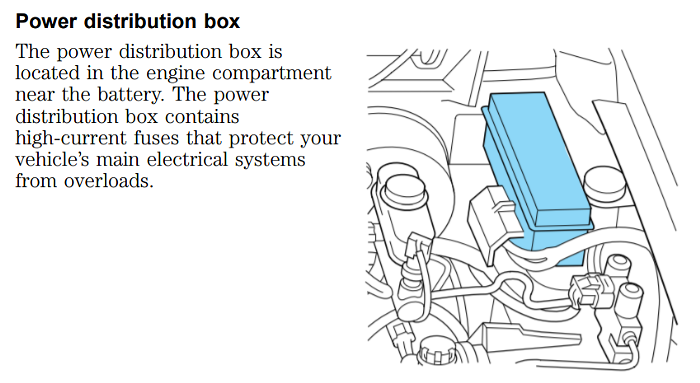
Not all of your fuses are in the panel under the dash. There is also a fuse panel (power distribution box) in the engine compartment on the drivers side of the vehicle.
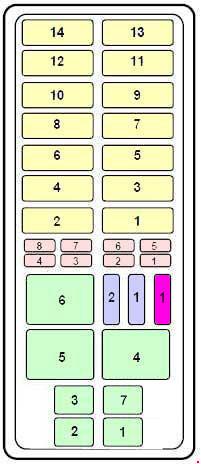
| Number | Ampere rating [A] | Description |
| Maxi fuses | ||
| 1 | — | — |
| 2 | 30 | PCM Power |
| 3 | 20 | Fuel System, Anti-Theft System |
| 4 | 20 | Headlamps |
| 5 | 30 | ABS system |
| 6 | 30 | ABS system |
| 7 | — | — |
| 8 | 20 | Parking Lamps |
| 9 | 40 | Blower Motor |
| 10 | 20 | Power Locks, Power Windows, Power Seat |
| 11 | 20 | PCM Memory, Horn |
| 12 | — | — |
| 13 | 50 | Instrument Panel Fuse |
| 14 | 50 | Ignition |
| Mini fuses | ||
| 1 | 20 | JBL System |
| 2 | 30 | Power Point |
| 3 | 15 | HEGO |
| 4 | 20 | 4 Wheel System |
| 10 | Air Bag System | |
| 5 | 15 | PCM Memory Power |
| 6 | 15 | Alternator system |
| 7 | 10 | Air Bag System |
| 20 | 4 Wheel System | |
| 8 | 15 | DRL/Fog Lamps/Off-Road Lamps |
| Relay | ||
| 1 | Wiper Run Relay | |
| 2 | Horn Relay | |
| 3 | Fog Lamp Relay | |
| 4 | WOT A/C Relay | |
| 5 | PCM Power Relay | |
| 6 | Fuel Pump Relay | |
| 7 | Wiper HI/LO Relay | |
| Diode | ||
| 1 | ABS diode | |
| 2 | PCM diode | |
| Resistor | ||
| 1 | RABS Resistor | |
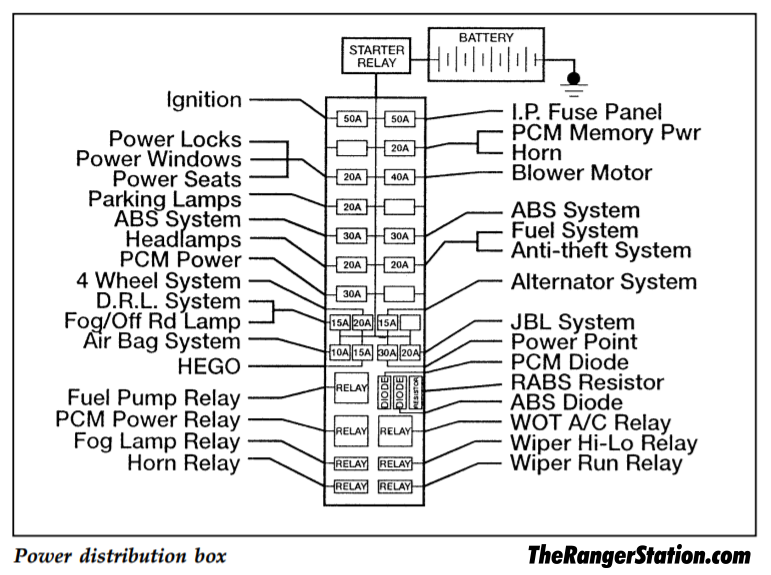
Checking and Replacing Fuses
If you need to check a fuse, follow these steps:
1. Find the fuse panel, which is located in the left end of the instrument panel. The power distribution box (described earlier in this section) is found in the engine compartment, mounted on a bracket attached to the drivers side fender apron.
To access the fuse panel, remove the fuse panel cover by inserting your finger in the divot and pulling on the cover. The underside of the cover contains four spare fuses. A fuse pulling tool is located in the lower right corner of the fuse panel in case you need to replace a blown fuse.
Color Coded: The spare fuses for your vehicle are color coded as follows:
- 10 amp — red
- 15 amp — light blue
- 20 amp — natural
- 30 amp — light green.
See further down on this page for examples
2. On the fuse panel cover, find the number of the fuse you want to check. The diagram on the cover tells you where to
locate the fuse on the panel.
3. Check the fuse to see if it is blown. Look through the clear side of the fuse to see if the metal wire inside is separated. If it is, the fuse is blown and should be replaced.
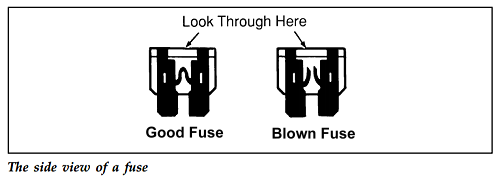
Another method for testing fuses is to use a Bussmann fuse tester. There’s no need to remove the fuse from the holder. You simply adjust the prong width on the tester to line up with the bare metal spots on the end of the fuse, and then watch for the indicator light to glow signaling that the fuse is good.
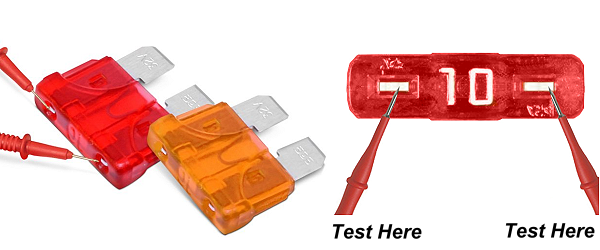
4. Replace the fuse with one that has the right amperage rating
*WARNING Always replace a fuse with one that has the specified amperage rating. Using a fuse with a higher amperage rating can cause severe wire damage and could start a fire.
5. Put the fuse panel cover back on.
Even after you replace a fuse, it will continue to blow if you do not find what caused the overload. If the fuse continues to blow, have your electrical system checked.
Fuse Color / Ratings:
As mentioned above, fuses are color coded to their AMP rating. See the image below for examples.
